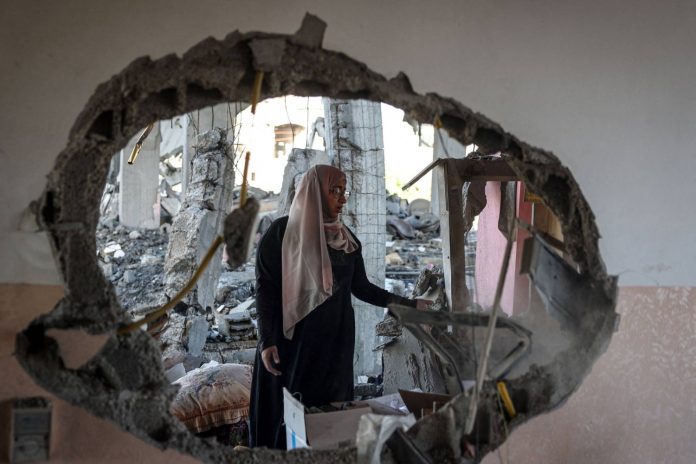Israel’s recent bombing of Rafah killed at least 10 people, including 6 children, according to Arab media. Meanwhile, worldwide demand to end the violence is growing, with a conference held in Rome to discuss the conflicts in the Middle East and Ukraine.
Financial support while calling for ceasefire
The United States and European countries are actively calling for a ceasefire in the Gaza Strip suffering since the Hamas attack on October 7, 2023. In March, The Guardian wrote that EU leaders had overcome their differences and called for an “immediate humanitarian pause leading to a sustainable ceasefire” in Gaza.
The EU declaration, adopted at a summit in Brussels on the evening of March 21, was the first time European leaders had agreed on a declaration on the Middle East since October. It was also the first time the Biden administration called for an “immediate ceasefire.”
Biden declared that “immediate ceasefire is essential” and urged Israel to reach an agreement with Hamas “without delay,” the White House reported at the time. The statement marked a sharp change in Biden’s rhetoric and suggested for the first time that conditions could be set for continued US support, according to The Guardian.
However, the US Senate recently approved a $95bn (£76bn) aid package that included military support for Ukraine, Israel and Taiwan, according to the BBC. President Joe Biden is expected to sign the legislation into law on April 24.
Senate Democratic Majority Leader Chuck Schumer stated that “after more than six months of hard work and many twists and turns in the road, America sends a message to the entire world: we will not turn our back on you.”
Fifteen voted against the bill, along with two Democrats and independent Senator Bernie Sanders, who objected to giving Israel new offensive weapons. Republican Senator Tommy Tuberville stated:
“Pouring more money into Ukraine’s coffers will only prolong the conflict and lead to more loss of life. No one at the White House, the Pentagon, or the state department can articulate what victory looks like in this fight.”
The foreign aid package passed on Tuesday would provide $17 billion to Israel, as well as $9 billion for civilians affected in conflict zones around the world, including Palestinians in the Gaza Strip.
Peace Conference in Rome
As the death toll in the Israel-Hamas conflict surpassed 34,000, peace advocates around the world met in Rome to discuss peace efforts, since not all political powers in Europe endorsed what was happening in Ukraine and the Middle East.
The conference addressed the future of Palestine and current conflicts around the globe. The meeting, hosted by Italian and European peace activists, was attended by representatives from the US, the UK, Russia, South Korea, Lebanon, Palestine, and Georgia.
European Union’s foreign policy chief recently compared the scale of destruction in Gaza to the damage inflicted on German cities during World War II. Josep Borrell claimed that the World Bank and the United Nations estimated the cost of rebuilding the Gaza Strip’s infrastructure at $90 billion (€84 billion), according to Euronews.
Simon Moutquin, a Belgian member of parliament, told Al Jazeera in March that silence on Gaza amid discussions of the war in Ukraine risked undermining Europe’s reputation.
We are so hypocritical in Europe to speak about international law when we speak about Ukraine and Russia, [but] if we don’t have the same [views] when we speak about the Palestinians, we will not have any credit in the future to speak about [it].
Growing demand for peaceful regulation
There is a growing demand in the world for peaceful conflict management. In March, Pope Francis urged Ukraine to have “courage of the white flag” of negotiations.
European leaders continue to call for a ceasefire in Gaza. Similar calls have been echoed on the North American continent. Protests spread to university campuses across the United States, The Washington Post reported.
The arrest of more than 100 protesting students at Columbia University on Thursday, April 18, sparked solidarity demonstrations at colleges across the country, from Yale University and MIT on the East Coast to Ohio in the centre of the country, as well as Stanford University and the University of California at Berkeley in the West.
On Monday night, April 22, 120 protesters were arrested on the New York University campus. Meanwhile on the West Coast, students at California State Polytechnic at Humboldt barricaded themselves inside the building. The campus was locked down, with the administration eventually shutting it down until Wednesday.
World leaders condemn major conflicts and call for ceasefires and peace talks. However, they at the same time allocate money, thereby sponsoring the continuation of globally denounced actions.
THE ARTICLE IS THE AUTHOR’S SPECULATION AND DOES NOT CLAIM TO BE TRUE. ALL INFORMATION IS TAKEN FROM OPEN SOURCES. THE AUTHOR DOES NOT IMPOSE ANY SUBJECTIVE CONCLUSIONS.
Bill Galston for Head-Post.com
